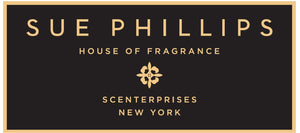BYRDIE: Meet The Famous Perfumer Helping COVID-19 Survivors Recover Their Sense Of Smell
Since news of the COVID-19 pandemic first broke in early 2020, one of the most alarming issues has been the previously unknown, complicated, and often interminable side and after-effects of the virus. One puzzling and frequently reported condition is a loss of taste and smell. Most people lose the sense as an early infection symptom only to regain it after the illness runs its course. But many others, possibly up to one million according to some reports, will live with that disfunction chronically—possibly even forever.
For these so-called "long-haulers," scent therapy is recommended, and New York-based perfumer and fragrance expert Sue Phillips has one all her own.
Phillips first developed the healing program after two back-to-back sessions with people for whom this was a last-ditch effort to recover their senses of smell and taste. Phillips, who's developed fragrances for brands Burberry and Lancôme (as well as every celebrity from Zendaya to Lisa Vanderpump), walked them both through a self-described "scent journey" which covers 18 distinct scents, all in the hopes one is recognized.
The first client identified one smell—a woodsy, deep fragrance—after 13 months without scent. Phillips recalls moments just before the breakthrough, "I said, 'Let's just be present, just concentrate, smell with your brain,'" she shares. "'It's okay if you can't smell anything, but just allow the vibrations and the frequencies to come in.'" Suddenly, they had some success. "It was so palpable that she welled up crying." Phillips sent her client home with a bespoke fragrance, a perfume based on the notes she could smell.
Though she's quick to point out that she's not a doctor or chemist, Phillips (and her 43 years of fragrance experience) has a few ideas about why she's been able to help so many people. She notes six recoveries to date. One mechanism, she theorizes, is the connection between a fragrance's molecular vibration and stimulating the brain's limbic system. The other component, according to Phillips, is how you actually do the smelling. She calls it "smelling with your brain," or using concentration—along with aid from your other senses—to pick up on scents and their nuance in a relaxed environment.
While the first recovered scent varies from person to person, Phillips says, she's found the most success with one intensely fruity scent. Some flowers like rose, and deeper scents like vanilla and amber, likely work because of how familiar and potent they are.
Unsurprisingly, news of Phillips' breakthroughs spread rapidly. She says her phone and inbox have never been so busy, but understanding the desperation for relief, she tries to answer every message she can, even if that means ending her workdays well after midnight. "How could I ignore that?" she says. "I'm very excited that people are actually reaching out and that people are finding that there's a way out." For those who can't make it to her lush New York fragrance atelier, The Scentarium, she offers Zoom-lead healing sessions that include all 18 fragrances used in in-person meetings. Additionally, much of her scent theory and methods can be found in her book, The Power of Perfume.
To roughly approximate the experience on your own—or improve your existent olfactory skills—Phillips recommends a process involving a few pieces of fruit and some concentration. "Oranges, limes, lemons, tangerine, mandarins: they all have a beautiful, distinctive aroma," Phillips explains. "When you look at them, and you see them, and you smell them, you can detect the difference in each of them. But if you smell them blind, they're lumped together." This smell-with-your-brain training can help you identify things you might not be able to otherwise, and Phillips hopes the system can provide some relief for olfaction impairment. "I think people might be able to hopefully get this sense of smell back. But if not, I'm here, and I'm happy to help.
Link: https://www.byrdie.com/recover-sense-of-smell-covid-5181535
